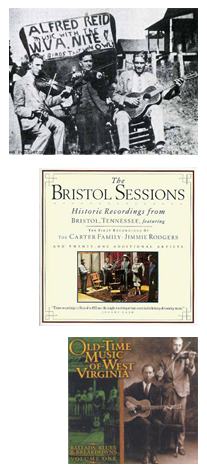Blind Alfred Reed
1880-1956, Born in Floyd, VA
Born blind on June 15, 1880, in Floyd, VA, Alfred Reed spent most of his life in Princeton and Hinton, WV. An accomplished musician and songwriter, Reed did his best to provide for his wife and six children. He scraped together a living playing at local dances, in churches and on the streets; he also gave music lessons and sold copies of his song lyrics.
Reed was discovered by Victor record executive Ralph Peer in 1927 on the same trip that turned up the Carter Family and Jimmie Rodgers. When Peer began soliciting musicians for a recording session in Bristol, on the Tennessee and Virginia border, he sent a telegram to Reed whose song about a recent train accident, “The Wreck of The Virginian,” was receiving regional attention. On July 28, 1927, Reed recorded four sides in a makeshift studio set up in a former furniture store. Reed later traveled to Camden, NJ, and New York City to record with his son, Arville Reed. He went on to release 21 sides on the Victor label until his recording career was eventually cut short by the effects of the Great Depression.
Reed’s original songs are remarkable in their timelessness. The sentiments expressed in “You’ll Miss Me” could have been written today, while the sly humor of “Black & Blue Blues” and “Woman’s Been After Man Ever Since,” neither of which are politically correct by today’s standards, are undeniably clever. Meanwhile, social commentaries like “Money Cravin’ Folks” and his most famous song, “How Can a Poor Man Stand Such Times and Live,” remain relevant after nearly eight decades.
By the 1950s, Alfred Reed’s recordings had been unavailable for more than 20 years, and royalties dwindled to a trickle. Still, Reed kept composing, writing the lyrics out in braille until he died on January 17, 1956, at the age of 76.
Reed’s music was all but forgotten until the folk music revival of the 1960s. The New Lost City Ramblers recorded some of his tunes, but it was Ry Cooder’s early ’70s recordings that introduced Reed’s songs to a new generation. Meanwhile, Rounder Records released an LP of the original masters. Numerous other covers of “Poor Man” followed and, in 2006, Bruce Springsteen debuted his version with added lyrics at the New Orleans Jazz and Heritage Festival. In 2007, in conjunction with his induction, the West Virginia Music Hall of Fame released Always Lift Him Up: A Tribute to Blind Alfred Reed, which featured updated versions of Reed’s songs by some of the state’s best-known musicians.
